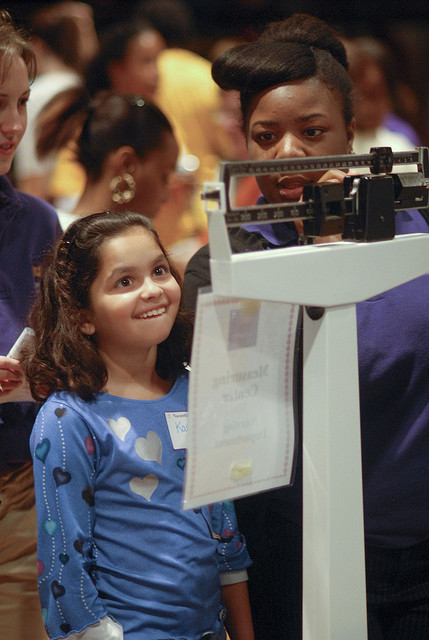I was preparing to give a talk at The Brooklyn Museum’s Elizabeth A. Sackler Center for Feminist Art, on a panel called “Ferocious BMI! Women Artists and the Body.” There I was, before the panel, innocently having a coffee with a dear friend, when I learned something shocking about her child’s otherwise progressive school: that they do yearly BMI (body mass index) measurements on their students.
Let me just clarify. These people are putting their students on scales. In school.
Real life hit me in the face. Was this Brave New World? Big Brother is Watching? I had recently read about CVS measuring their employees’ BMI, a move which, in my mind, puts in jeopardy employees’ right to health privacy, as well as potentially their jobs and health insurance. All it truly accomplishes is discrimination. As the writers as Jezebel put it, “Heads up, Corporate America, punishing employees for being fat won’t make them skinny.”
Here I was, about to go give a talk about how the BMI is not only a problematic and perhaps spurious way to measure health (just check out this recent NYT article about a study which suggests that there is in fact a LOWER risk of death for the overweight), but how the ‘obesity epidemic’ in general has been framed as a ‘moral panic’ – a threat to the very social order. My talk focused on the cultural contexts of such perceived threats: the fact that ‘fat panic’ also reinforces hierarchies of class, race, and sex, and how such threats are used to shame and blame individuals and hold some bodies up as ‘normative’ and others as ‘deviant’, rather than holding systems accountable (like the U.S. food industry for their use of GMOs or the market glut of processed foodstuffs).
And there was my friend, telling me how her child’s public school had not only bought into this mentality, but was using it as a measuring stick to evaluate children – sending home ‘friendly’ notes to families whose children’s numbers weren’t ‘right’ with advice like ‘curb down on those sodas!’ (Never mind if your family didn’t even buy soft drinks!) Even worse, because these measurements were done in school, elementary school children themselves were comparing themselves to one another – whispering about a girl who was 103 pounds, regardless of her height, and learning, oh, so young, to use numbers like weight and BMI as proxies not for health, but for self-worth, popularity, beauty, and desirability.
And my friend’s school is not alone. CNN reports: ”According to the National Association of School Boards of Education, about a dozen states require some sort of weight recording and reporting as a means of combating childhood obesity.” While the American Academy of Pediatrics recommended, in 2003 mind you, that BMI be tracked regularly, what they did not recommend was that schools do that tracking.
And so, although I may be a voice shouting into the wind, I wanted – no NEEDED – to say something. And say it loud:
There is no excuse — NO EXCUSE – for putting little boys and girls on weight scales in school. Responsible administrators should not be doing it. We educators and parents cannot allow it.
To read the rest of this essay, please visit Adios, Barbie!

This comment has been removed by the author.
ReplyDelete